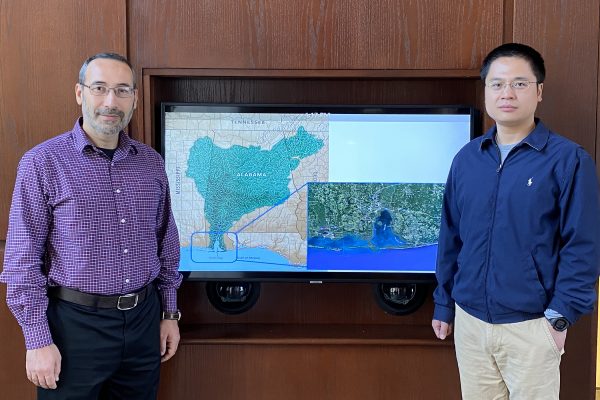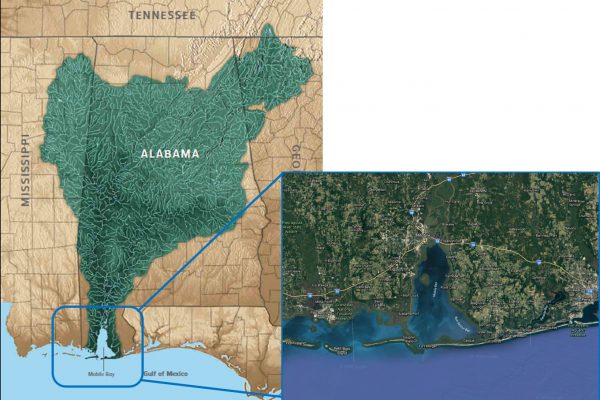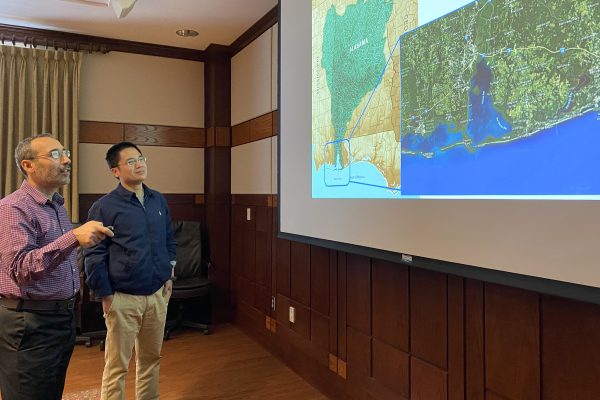Two Auburn University researchers are part of a team that has launched a study on the viability of several species that dwell in the estuaries of the Gulf of Mexico and have experienced a steep population decline in recent years. The work, which seeks to strengthen the creatures’ resilience to damaging environmental factors, could play a large role in ensuring their future sustainability.
Latif Kalin, professor of hydrology in the School of Forestry and Wildlife Sciences, and Di Tian, assistant professor in Crop, Soil and Environmental Sciences in the College of Agriculture, are working on the $2.8 million study, “Building Resilience for Oysters, Blue Crabs and Spotted Seatrout to Environmental Trends and Variability.” The project is funded by the National Oceanic and Atmospheric Association, or NOAA, as part of its NOAA RESTORE program, which awarded approximately $15.6 million to research teams that are studying trends in living coastal and marine resources and the processes driving them in the Gulf of Mexico region.
“Oysters, blue crabs and spotted seatrout populations in the Gulf of Mexico have suffered substantial declines,” Kalin said. “Unfortunately, the relationship between their population trends and the environmental factors are not well understood. Through this project, we hope to disentangle this relationship and provide an end-to-end perspective from climate to watershed, to coastal hydrodynamic, to estuarine ecosystem and populations to services and economics.
“This project will facilitate cooperative ecosystem management to build the resilience of oyster, blue crab and spotted seatrout to environmental change.”
The results of the research, a partnership with the Alabama Department of Conservation and Natural Resources, the Mobile Bay National Estuary Program and other stakeholders, will feed into resource management and restoration planning decisions as well as efforts toward holistic ecosystem management of Mobile Bay.
“More broadly, the project’s research and outreach components will support widespread management efforts to increase coastal resource resilience to environmental trends and variability,” Kalin said.
Tian said the importance of this work cannot be overstated.
“With respect to the solution, we will create a next-generation numerical model to assess and predict these impacts,” he said. “This information will help resource managers in the Mobile Bay area and beyond to make evidence-based decisions and best management strategies for estuarine ecosystem restorations under the current and future climate.”
Lead researcher John Lehrter, a senior marine scientist at the Dauphin Island Sea Lab and an associate professor in the Department of Marine Sciences at the University of South Alabama, said he hopes the project leads to a better understanding of the way environmental variability and trends—both short-term factors such as flood and drought, and directional changes including global warming, sea-level rise and ocean acidification—will affect these important estuarine species.
Lehrter said the study will impact the environment and the economy.
“Many estuarine fish and shellfish populations are imperiled or in decline due to the rapid changes that have occurred in estuaries,” he said. “For example, in 2019, the natural oyster fishery in Alabama was not opened due to a lack of oysters. This was the first time ever that the fishery was not opened. We expect that our research will identify some solutions to minimize disturbances to estuaries and to rebuild the populations of important species.”
In addition to Kalin, Tian and Lehrter, the team includes eight researchers representing the Dauphin Island Sea Lab, Mississippi State University and North Carolina State University.
(Written by Teri Greene)












